Arden University FIN4001 Assignment: Finance and Budgeting Analysis
VerifiedAdded on 2022/11/14
|12
|2983
|230
Homework Assignment
AI Summary
This document presents a comprehensive solution to a FIN4001 Introduction to Finance assignment. The solution addresses several key areas, including the implications of corporate governance codes in preventing corporate scandals, contrasting the advantages of a sole trader versus a company, and providing detailed budgeting exercises. The budgeting section includes a production budget, calculation of unit costs, and a cash budget, as well as a discussion on the disadvantages of zero-based budgeting. Furthermore, the assignment analyzes cost-volume-profit analysis, including its strengths and weaknesses. Finally, the solution outlines various funding options available to an entrepreneur, considering equity sources and personal investment strategies to maintain a specific ownership stake. The document provides detailed calculations, explanations, and analyses to aid in understanding the concepts of finance.

1
FIN4001
Introduction to Finance
FIN4001
Introduction to Finance
Paraphrase This Document
Need a fresh take? Get an instant paraphrase of this document with our AI Paraphraser
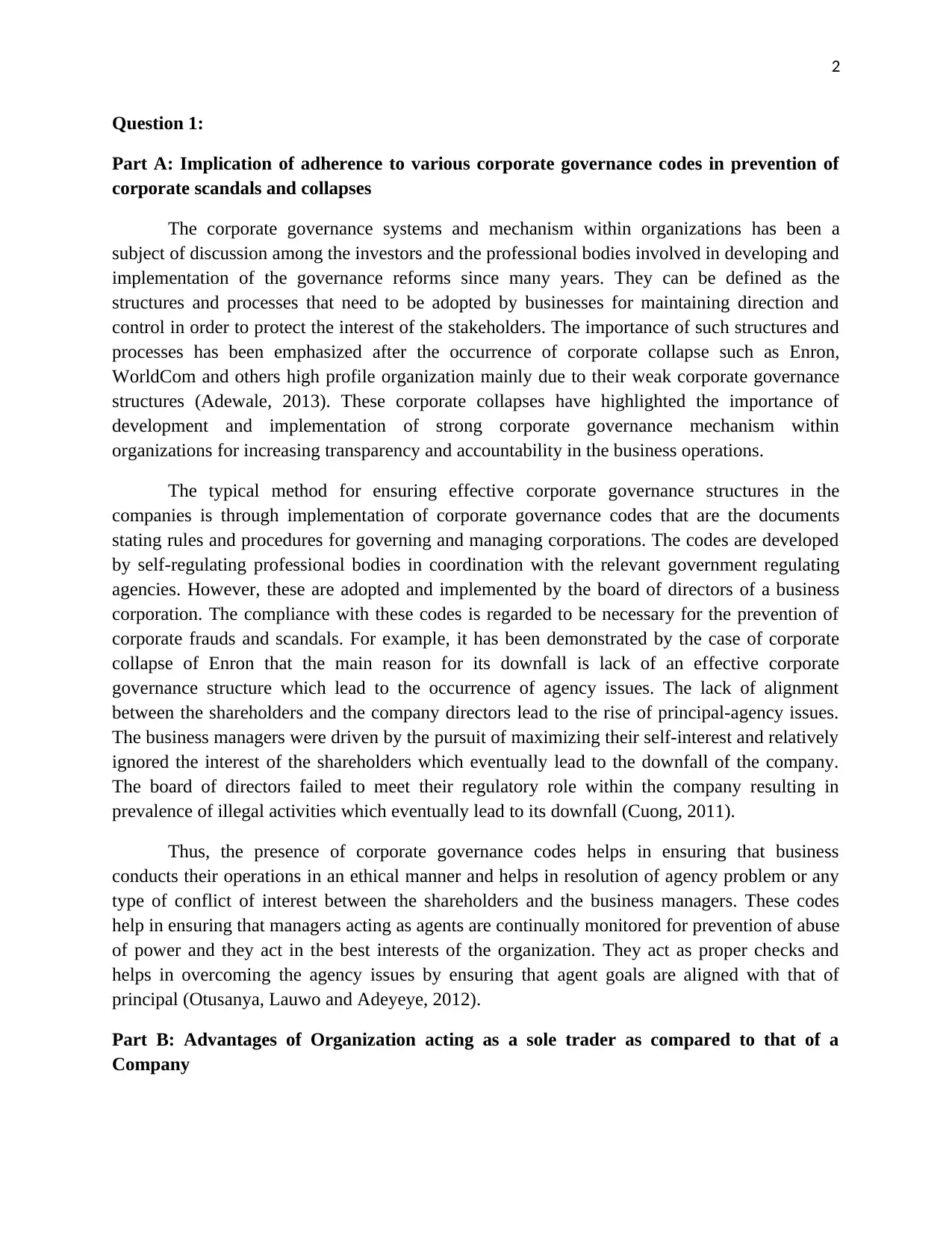
2
Question 1:
Part A: Implication of adherence to various corporate governance codes in prevention of
corporate scandals and collapses
The corporate governance systems and mechanism within organizations has been a
subject of discussion among the investors and the professional bodies involved in developing and
implementation of the governance reforms since many years. They can be defined as the
structures and processes that need to be adopted by businesses for maintaining direction and
control in order to protect the interest of the stakeholders. The importance of such structures and
processes has been emphasized after the occurrence of corporate collapse such as Enron,
WorldCom and others high profile organization mainly due to their weak corporate governance
structures (Adewale, 2013). These corporate collapses have highlighted the importance of
development and implementation of strong corporate governance mechanism within
organizations for increasing transparency and accountability in the business operations.
The typical method for ensuring effective corporate governance structures in the
companies is through implementation of corporate governance codes that are the documents
stating rules and procedures for governing and managing corporations. The codes are developed
by self-regulating professional bodies in coordination with the relevant government regulating
agencies. However, these are adopted and implemented by the board of directors of a business
corporation. The compliance with these codes is regarded to be necessary for the prevention of
corporate frauds and scandals. For example, it has been demonstrated by the case of corporate
collapse of Enron that the main reason for its downfall is lack of an effective corporate
governance structure which lead to the occurrence of agency issues. The lack of alignment
between the shareholders and the company directors lead to the rise of principal-agency issues.
The business managers were driven by the pursuit of maximizing their self-interest and relatively
ignored the interest of the shareholders which eventually lead to the downfall of the company.
The board of directors failed to meet their regulatory role within the company resulting in
prevalence of illegal activities which eventually lead to its downfall (Cuong, 2011).
Thus, the presence of corporate governance codes helps in ensuring that business
conducts their operations in an ethical manner and helps in resolution of agency problem or any
type of conflict of interest between the shareholders and the business managers. These codes
help in ensuring that managers acting as agents are continually monitored for prevention of abuse
of power and they act in the best interests of the organization. They act as proper checks and
helps in overcoming the agency issues by ensuring that agent goals are aligned with that of
principal (Otusanya, Lauwo and Adeyeye, 2012).
Part B: Advantages of Organization acting as a sole trader as compared to that of a
Company
Question 1:
Part A: Implication of adherence to various corporate governance codes in prevention of
corporate scandals and collapses
The corporate governance systems and mechanism within organizations has been a
subject of discussion among the investors and the professional bodies involved in developing and
implementation of the governance reforms since many years. They can be defined as the
structures and processes that need to be adopted by businesses for maintaining direction and
control in order to protect the interest of the stakeholders. The importance of such structures and
processes has been emphasized after the occurrence of corporate collapse such as Enron,
WorldCom and others high profile organization mainly due to their weak corporate governance
structures (Adewale, 2013). These corporate collapses have highlighted the importance of
development and implementation of strong corporate governance mechanism within
organizations for increasing transparency and accountability in the business operations.
The typical method for ensuring effective corporate governance structures in the
companies is through implementation of corporate governance codes that are the documents
stating rules and procedures for governing and managing corporations. The codes are developed
by self-regulating professional bodies in coordination with the relevant government regulating
agencies. However, these are adopted and implemented by the board of directors of a business
corporation. The compliance with these codes is regarded to be necessary for the prevention of
corporate frauds and scandals. For example, it has been demonstrated by the case of corporate
collapse of Enron that the main reason for its downfall is lack of an effective corporate
governance structure which lead to the occurrence of agency issues. The lack of alignment
between the shareholders and the company directors lead to the rise of principal-agency issues.
The business managers were driven by the pursuit of maximizing their self-interest and relatively
ignored the interest of the shareholders which eventually lead to the downfall of the company.
The board of directors failed to meet their regulatory role within the company resulting in
prevalence of illegal activities which eventually lead to its downfall (Cuong, 2011).
Thus, the presence of corporate governance codes helps in ensuring that business
conducts their operations in an ethical manner and helps in resolution of agency problem or any
type of conflict of interest between the shareholders and the business managers. These codes
help in ensuring that managers acting as agents are continually monitored for prevention of abuse
of power and they act in the best interests of the organization. They act as proper checks and
helps in overcoming the agency issues by ensuring that agent goals are aligned with that of
principal (Otusanya, Lauwo and Adeyeye, 2012).
Part B: Advantages of Organization acting as a sole trader as compared to that of a
Company
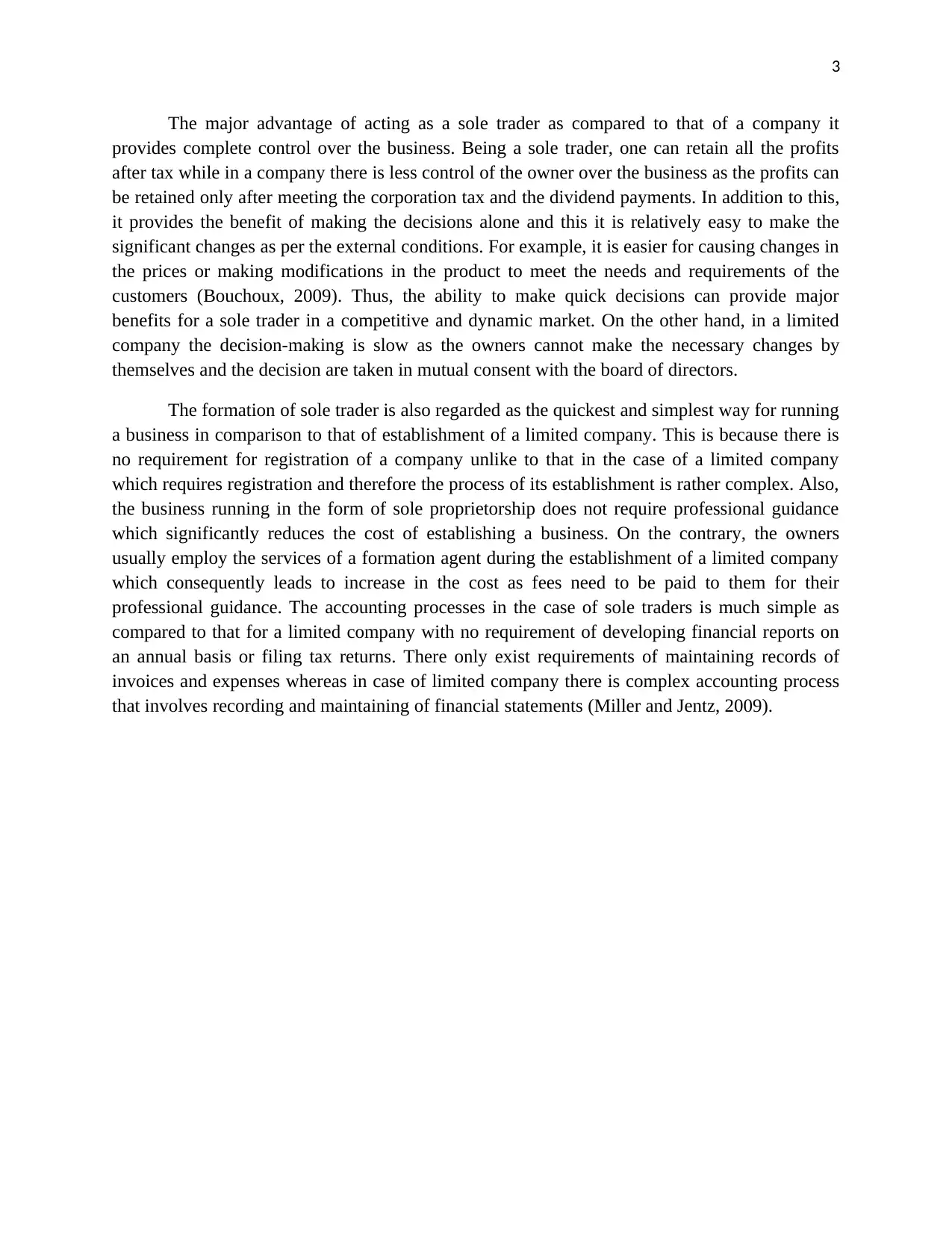
3
The major advantage of acting as a sole trader as compared to that of a company it
provides complete control over the business. Being a sole trader, one can retain all the profits
after tax while in a company there is less control of the owner over the business as the profits can
be retained only after meeting the corporation tax and the dividend payments. In addition to this,
it provides the benefit of making the decisions alone and this it is relatively easy to make the
significant changes as per the external conditions. For example, it is easier for causing changes in
the prices or making modifications in the product to meet the needs and requirements of the
customers (Bouchoux, 2009). Thus, the ability to make quick decisions can provide major
benefits for a sole trader in a competitive and dynamic market. On the other hand, in a limited
company the decision-making is slow as the owners cannot make the necessary changes by
themselves and the decision are taken in mutual consent with the board of directors.
The formation of sole trader is also regarded as the quickest and simplest way for running
a business in comparison to that of establishment of a limited company. This is because there is
no requirement for registration of a company unlike to that in the case of a limited company
which requires registration and therefore the process of its establishment is rather complex. Also,
the business running in the form of sole proprietorship does not require professional guidance
which significantly reduces the cost of establishing a business. On the contrary, the owners
usually employ the services of a formation agent during the establishment of a limited company
which consequently leads to increase in the cost as fees need to be paid to them for their
professional guidance. The accounting processes in the case of sole traders is much simple as
compared to that for a limited company with no requirement of developing financial reports on
an annual basis or filing tax returns. There only exist requirements of maintaining records of
invoices and expenses whereas in case of limited company there is complex accounting process
that involves recording and maintaining of financial statements (Miller and Jentz, 2009).
The major advantage of acting as a sole trader as compared to that of a company it
provides complete control over the business. Being a sole trader, one can retain all the profits
after tax while in a company there is less control of the owner over the business as the profits can
be retained only after meeting the corporation tax and the dividend payments. In addition to this,
it provides the benefit of making the decisions alone and this it is relatively easy to make the
significant changes as per the external conditions. For example, it is easier for causing changes in
the prices or making modifications in the product to meet the needs and requirements of the
customers (Bouchoux, 2009). Thus, the ability to make quick decisions can provide major
benefits for a sole trader in a competitive and dynamic market. On the other hand, in a limited
company the decision-making is slow as the owners cannot make the necessary changes by
themselves and the decision are taken in mutual consent with the board of directors.
The formation of sole trader is also regarded as the quickest and simplest way for running
a business in comparison to that of establishment of a limited company. This is because there is
no requirement for registration of a company unlike to that in the case of a limited company
which requires registration and therefore the process of its establishment is rather complex. Also,
the business running in the form of sole proprietorship does not require professional guidance
which significantly reduces the cost of establishing a business. On the contrary, the owners
usually employ the services of a formation agent during the establishment of a limited company
which consequently leads to increase in the cost as fees need to be paid to them for their
professional guidance. The accounting processes in the case of sole traders is much simple as
compared to that for a limited company with no requirement of developing financial reports on
an annual basis or filing tax returns. There only exist requirements of maintaining records of
invoices and expenses whereas in case of limited company there is complex accounting process
that involves recording and maintaining of financial statements (Miller and Jentz, 2009).
⊘ This is a preview!⊘
Do you want full access?
Subscribe today to unlock all pages.

Trusted by 1+ million students worldwide
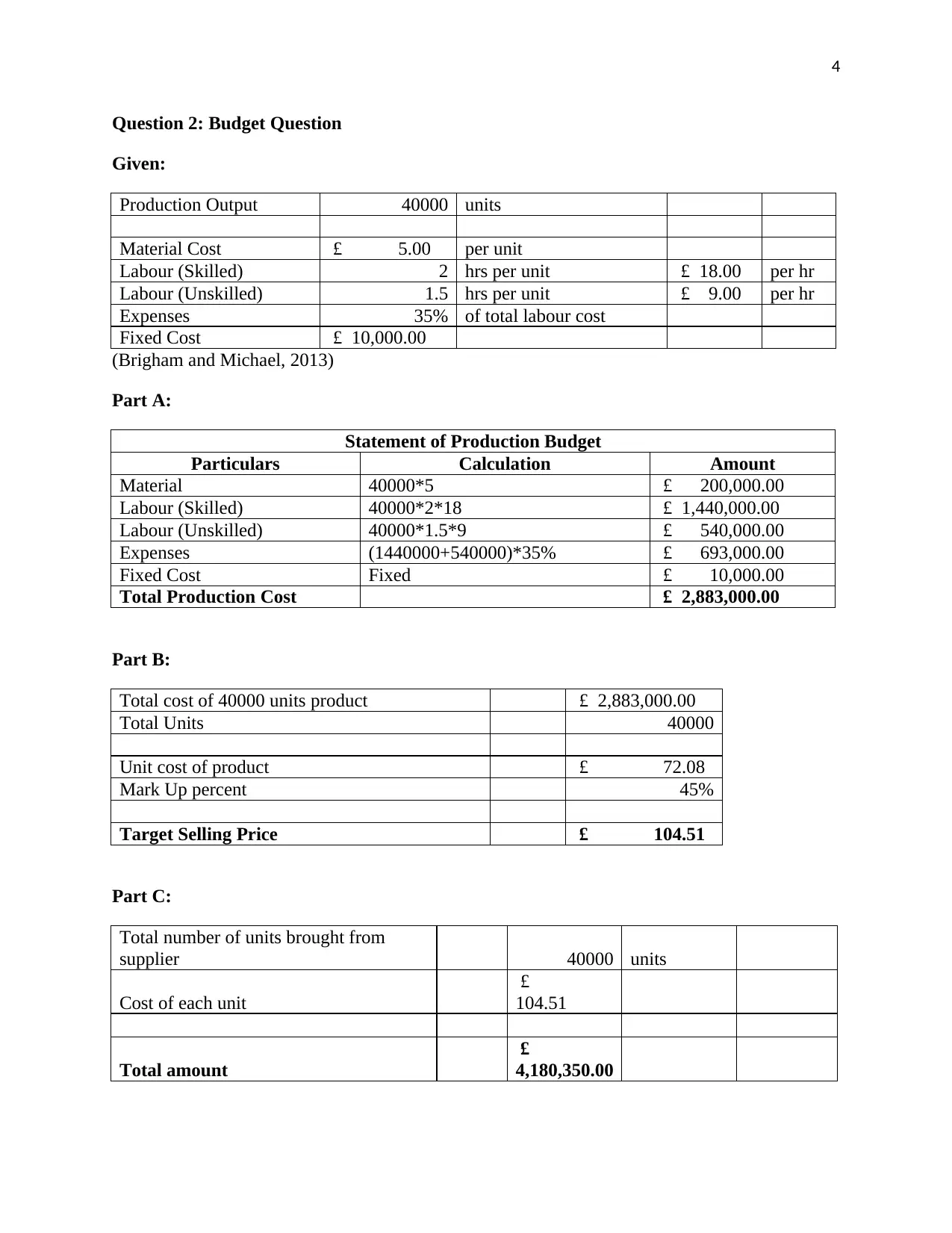
4
Question 2: Budget Question
Given:
Production Output 40000 units
Material Cost £ 5.00 per unit
Labour (Skilled) 2 hrs per unit £ 18.00 per hr
Labour (Unskilled) 1.5 hrs per unit £ 9.00 per hr
Expenses 35% of total labour cost
Fixed Cost £ 10,000.00
(Brigham and Michael, 2013)
Part A:
Statement of Production Budget
Particulars Calculation Amount
Material 40000*5 £ 200,000.00
Labour (Skilled) 40000*2*18 £ 1,440,000.00
Labour (Unskilled) 40000*1.5*9 £ 540,000.00
Expenses (1440000+540000)*35% £ 693,000.00
Fixed Cost Fixed £ 10,000.00
Total Production Cost £ 2,883,000.00
Part B:
Total cost of 40000 units product £ 2,883,000.00
Total Units 40000
Unit cost of product £ 72.08
Mark Up percent 45%
Target Selling Price £ 104.51
Part C:
Total number of units brought from
supplier 40000 units
Cost of each unit
£
104.51
Total amount
£
4,180,350.00
Question 2: Budget Question
Given:
Production Output 40000 units
Material Cost £ 5.00 per unit
Labour (Skilled) 2 hrs per unit £ 18.00 per hr
Labour (Unskilled) 1.5 hrs per unit £ 9.00 per hr
Expenses 35% of total labour cost
Fixed Cost £ 10,000.00
(Brigham and Michael, 2013)
Part A:
Statement of Production Budget
Particulars Calculation Amount
Material 40000*5 £ 200,000.00
Labour (Skilled) 40000*2*18 £ 1,440,000.00
Labour (Unskilled) 40000*1.5*9 £ 540,000.00
Expenses (1440000+540000)*35% £ 693,000.00
Fixed Cost Fixed £ 10,000.00
Total Production Cost £ 2,883,000.00
Part B:
Total cost of 40000 units product £ 2,883,000.00
Total Units 40000
Unit cost of product £ 72.08
Mark Up percent 45%
Target Selling Price £ 104.51
Part C:
Total number of units brought from
supplier 40000 units
Cost of each unit
£
104.51
Total amount
£
4,180,350.00
Paraphrase This Document
Need a fresh take? Get an instant paraphrase of this document with our AI Paraphraser
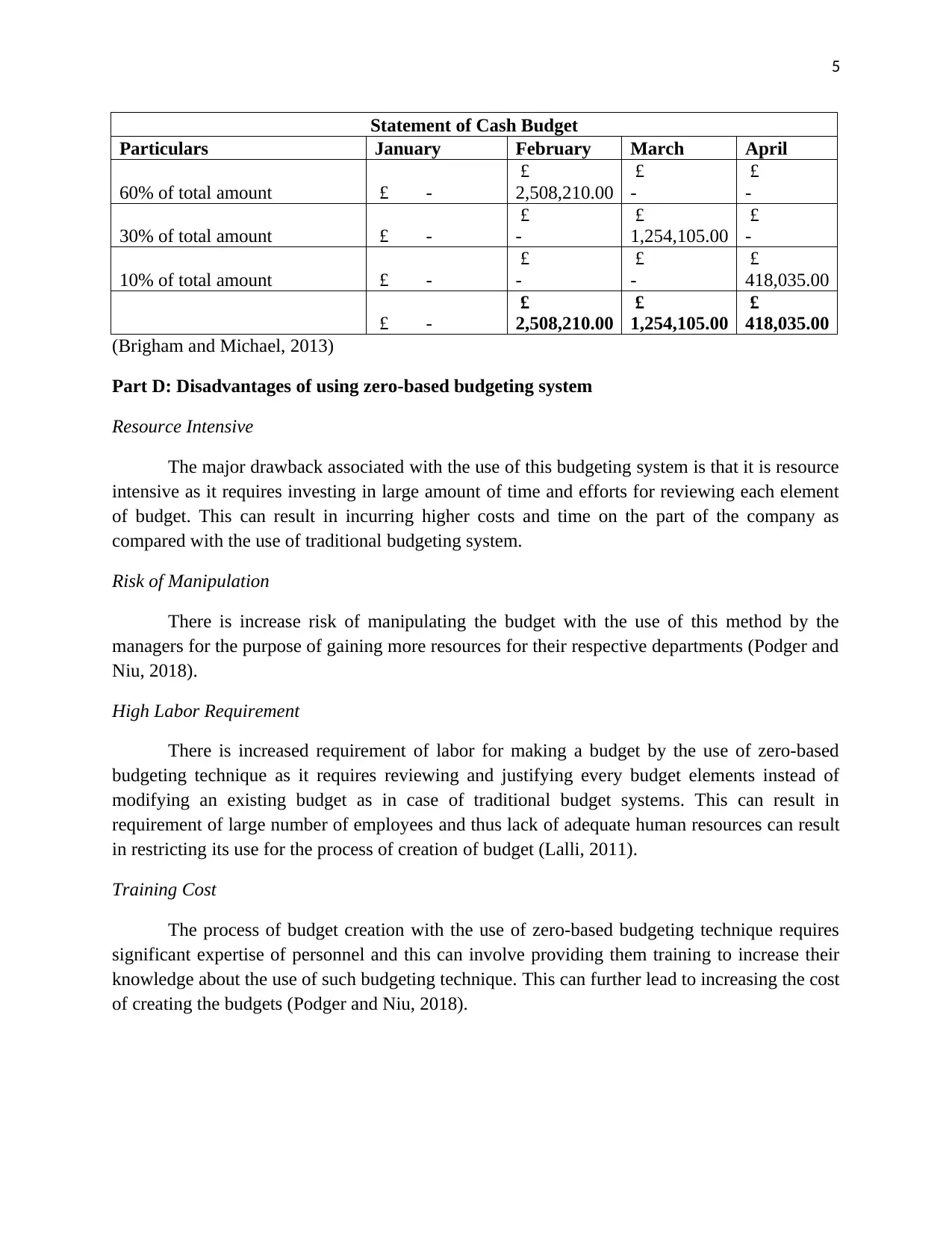
5
Statement of Cash Budget
Particulars January February March April
60% of total amount £ -
£
2,508,210.00
£
-
£
-
30% of total amount £ -
£
-
£
1,254,105.00
£
-
10% of total amount £ -
£
-
£
-
£
418,035.00
£ -
£
2,508,210.00
£
1,254,105.00
£
418,035.00
(Brigham and Michael, 2013)
Part D: Disadvantages of using zero-based budgeting system
Resource Intensive
The major drawback associated with the use of this budgeting system is that it is resource
intensive as it requires investing in large amount of time and efforts for reviewing each element
of budget. This can result in incurring higher costs and time on the part of the company as
compared with the use of traditional budgeting system.
Risk of Manipulation
There is increase risk of manipulating the budget with the use of this method by the
managers for the purpose of gaining more resources for their respective departments (Podger and
Niu, 2018).
High Labor Requirement
There is increased requirement of labor for making a budget by the use of zero-based
budgeting technique as it requires reviewing and justifying every budget elements instead of
modifying an existing budget as in case of traditional budget systems. This can result in
requirement of large number of employees and thus lack of adequate human resources can result
in restricting its use for the process of creation of budget (Lalli, 2011).
Training Cost
The process of budget creation with the use of zero-based budgeting technique requires
significant expertise of personnel and this can involve providing them training to increase their
knowledge about the use of such budgeting technique. This can further lead to increasing the cost
of creating the budgets (Podger and Niu, 2018).
Statement of Cash Budget
Particulars January February March April
60% of total amount £ -
£
2,508,210.00
£
-
£
-
30% of total amount £ -
£
-
£
1,254,105.00
£
-
10% of total amount £ -
£
-
£
-
£
418,035.00
£ -
£
2,508,210.00
£
1,254,105.00
£
418,035.00
(Brigham and Michael, 2013)
Part D: Disadvantages of using zero-based budgeting system
Resource Intensive
The major drawback associated with the use of this budgeting system is that it is resource
intensive as it requires investing in large amount of time and efforts for reviewing each element
of budget. This can result in incurring higher costs and time on the part of the company as
compared with the use of traditional budgeting system.
Risk of Manipulation
There is increase risk of manipulating the budget with the use of this method by the
managers for the purpose of gaining more resources for their respective departments (Podger and
Niu, 2018).
High Labor Requirement
There is increased requirement of labor for making a budget by the use of zero-based
budgeting technique as it requires reviewing and justifying every budget elements instead of
modifying an existing budget as in case of traditional budget systems. This can result in
requirement of large number of employees and thus lack of adequate human resources can result
in restricting its use for the process of creation of budget (Lalli, 2011).
Training Cost
The process of budget creation with the use of zero-based budgeting technique requires
significant expertise of personnel and this can involve providing them training to increase their
knowledge about the use of such budgeting technique. This can further lead to increasing the cost
of creating the budgets (Podger and Niu, 2018).

6
Question 3:
Given
Annual rent of gymnasium £ 15,000.00 per year
Quarterly marketing costs £ 3,000.00 per quarter
IT cost per consultation £ 2.00 per consultation
Total Consultation per month 125 per month
Energy Drink at each consultation £ 1.25 per consultation
Trainer’s labour cost £ 10.00 per consultation
Price per consultation £ 18.00 per consultation
(Damodaran, 2011)
Part A: Total Fixed Cost per month
Fixed Cost Amount Basis Amount per
month
Annual rent of gymnasium
£
15,000.00 per year
£
1,250.00
Quarterly marketing costs
£
3,000.00 per quarter
£
1,000.00
Fixed Cost per month
£
2,250.00
Part B: Total Variable Cost per month
Variable Cost Amount Basis Amount per
month
IT cost per consultation
£
2.00 per consultation
£
250.00
Energy Drink at each consultation
£
1.25 per consultation
£
156.25
Trainer’s labour cost
£
10.00 per consultation
£
1,250.00
Variable Cost per month
£
1,656.25
Part C: Contribution per month
Particulars Amount Basis Amount per
month
Selling Price
£
18.00 per consultation
£
2,250.00
Less: Variable Cost £ per consultation £
Question 3:
Given
Annual rent of gymnasium £ 15,000.00 per year
Quarterly marketing costs £ 3,000.00 per quarter
IT cost per consultation £ 2.00 per consultation
Total Consultation per month 125 per month
Energy Drink at each consultation £ 1.25 per consultation
Trainer’s labour cost £ 10.00 per consultation
Price per consultation £ 18.00 per consultation
(Damodaran, 2011)
Part A: Total Fixed Cost per month
Fixed Cost Amount Basis Amount per
month
Annual rent of gymnasium
£
15,000.00 per year
£
1,250.00
Quarterly marketing costs
£
3,000.00 per quarter
£
1,000.00
Fixed Cost per month
£
2,250.00
Part B: Total Variable Cost per month
Variable Cost Amount Basis Amount per
month
IT cost per consultation
£
2.00 per consultation
£
250.00
Energy Drink at each consultation
£
1.25 per consultation
£
156.25
Trainer’s labour cost
£
10.00 per consultation
£
1,250.00
Variable Cost per month
£
1,656.25
Part C: Contribution per month
Particulars Amount Basis Amount per
month
Selling Price
£
18.00 per consultation
£
2,250.00
Less: Variable Cost £ per consultation £
⊘ This is a preview!⊘
Do you want full access?
Subscribe today to unlock all pages.

Trusted by 1+ million students worldwide
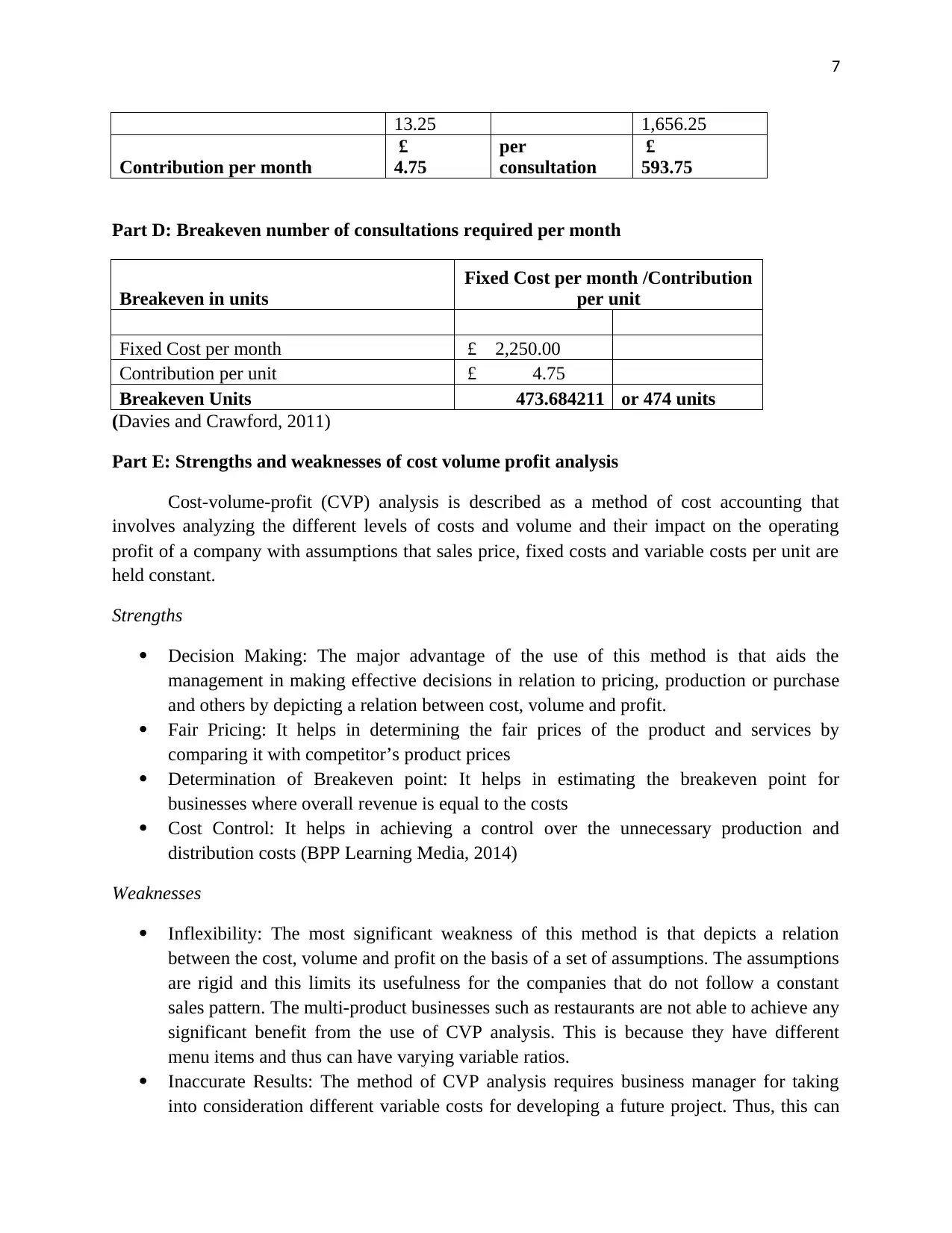
7
13.25 1,656.25
Contribution per month
£
4.75
per
consultation
£
593.75
Part D: Breakeven number of consultations required per month
Breakeven in units
Fixed Cost per month /Contribution
per unit
Fixed Cost per month £ 2,250.00
Contribution per unit £ 4.75
Breakeven Units 473.684211 or 474 units
(Davies and Crawford, 2011)
Part E: Strengths and weaknesses of cost volume profit analysis
Cost-volume-profit (CVP) analysis is described as a method of cost accounting that
involves analyzing the different levels of costs and volume and their impact on the operating
profit of a company with assumptions that sales price, fixed costs and variable costs per unit are
held constant.
Strengths
Decision Making: The major advantage of the use of this method is that aids the
management in making effective decisions in relation to pricing, production or purchase
and others by depicting a relation between cost, volume and profit.
Fair Pricing: It helps in determining the fair prices of the product and services by
comparing it with competitor’s product prices
Determination of Breakeven point: It helps in estimating the breakeven point for
businesses where overall revenue is equal to the costs
Cost Control: It helps in achieving a control over the unnecessary production and
distribution costs (BPP Learning Media, 2014)
Weaknesses
Inflexibility: The most significant weakness of this method is that depicts a relation
between the cost, volume and profit on the basis of a set of assumptions. The assumptions
are rigid and this limits its usefulness for the companies that do not follow a constant
sales pattern. The multi-product businesses such as restaurants are not able to achieve any
significant benefit from the use of CVP analysis. This is because they have different
menu items and thus can have varying variable ratios.
Inaccurate Results: The method of CVP analysis requires business manager for taking
into consideration different variable costs for developing a future project. Thus, this can
13.25 1,656.25
Contribution per month
£
4.75
per
consultation
£
593.75
Part D: Breakeven number of consultations required per month
Breakeven in units
Fixed Cost per month /Contribution
per unit
Fixed Cost per month £ 2,250.00
Contribution per unit £ 4.75
Breakeven Units 473.684211 or 474 units
(Davies and Crawford, 2011)
Part E: Strengths and weaknesses of cost volume profit analysis
Cost-volume-profit (CVP) analysis is described as a method of cost accounting that
involves analyzing the different levels of costs and volume and their impact on the operating
profit of a company with assumptions that sales price, fixed costs and variable costs per unit are
held constant.
Strengths
Decision Making: The major advantage of the use of this method is that aids the
management in making effective decisions in relation to pricing, production or purchase
and others by depicting a relation between cost, volume and profit.
Fair Pricing: It helps in determining the fair prices of the product and services by
comparing it with competitor’s product prices
Determination of Breakeven point: It helps in estimating the breakeven point for
businesses where overall revenue is equal to the costs
Cost Control: It helps in achieving a control over the unnecessary production and
distribution costs (BPP Learning Media, 2014)
Weaknesses
Inflexibility: The most significant weakness of this method is that depicts a relation
between the cost, volume and profit on the basis of a set of assumptions. The assumptions
are rigid and this limits its usefulness for the companies that do not follow a constant
sales pattern. The multi-product businesses such as restaurants are not able to achieve any
significant benefit from the use of CVP analysis. This is because they have different
menu items and thus can have varying variable ratios.
Inaccurate Results: The method of CVP analysis requires business manager for taking
into consideration different variable costs for developing a future project. Thus, this can
Paraphrase This Document
Need a fresh take? Get an instant paraphrase of this document with our AI Paraphraser

8
result in creating problems for the managers as they have to collect every significant
detail precisely for depicting accurate results. The incorrect collection of data can lead in
developing inaccurate projections (Brigham and Michael, 2013).
result in creating problems for the managers as they have to collect every significant
detail precisely for depicting accurate results. The incorrect collection of data can lead in
developing inaccurate projections (Brigham and Michael, 2013).
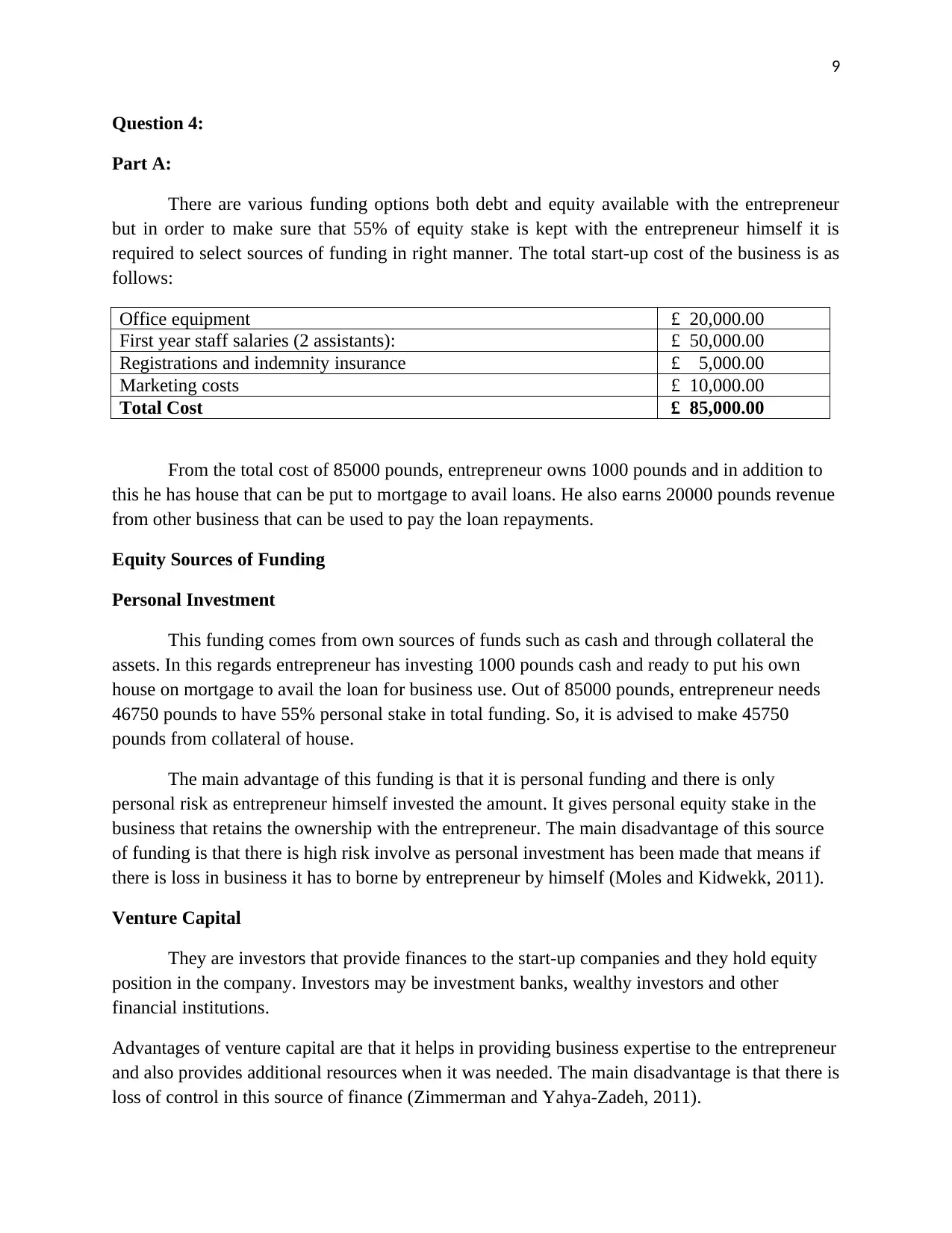
9
Question 4:
Part A:
There are various funding options both debt and equity available with the entrepreneur
but in order to make sure that 55% of equity stake is kept with the entrepreneur himself it is
required to select sources of funding in right manner. The total start-up cost of the business is as
follows:
Office equipment £ 20,000.00
First year staff salaries (2 assistants): £ 50,000.00
Registrations and indemnity insurance £ 5,000.00
Marketing costs £ 10,000.00
Total Cost £ 85,000.00
From the total cost of 85000 pounds, entrepreneur owns 1000 pounds and in addition to
this he has house that can be put to mortgage to avail loans. He also earns 20000 pounds revenue
from other business that can be used to pay the loan repayments.
Equity Sources of Funding
Personal Investment
This funding comes from own sources of funds such as cash and through collateral the
assets. In this regards entrepreneur has investing 1000 pounds cash and ready to put his own
house on mortgage to avail the loan for business use. Out of 85000 pounds, entrepreneur needs
46750 pounds to have 55% personal stake in total funding. So, it is advised to make 45750
pounds from collateral of house.
The main advantage of this funding is that it is personal funding and there is only
personal risk as entrepreneur himself invested the amount. It gives personal equity stake in the
business that retains the ownership with the entrepreneur. The main disadvantage of this source
of funding is that there is high risk involve as personal investment has been made that means if
there is loss in business it has to borne by entrepreneur by himself (Moles and Kidwekk, 2011).
Venture Capital
They are investors that provide finances to the start-up companies and they hold equity
position in the company. Investors may be investment banks, wealthy investors and other
financial institutions.
Advantages of venture capital are that it helps in providing business expertise to the entrepreneur
and also provides additional resources when it was needed. The main disadvantage is that there is
loss of control in this source of finance (Zimmerman and Yahya-Zadeh, 2011).
Question 4:
Part A:
There are various funding options both debt and equity available with the entrepreneur
but in order to make sure that 55% of equity stake is kept with the entrepreneur himself it is
required to select sources of funding in right manner. The total start-up cost of the business is as
follows:
Office equipment £ 20,000.00
First year staff salaries (2 assistants): £ 50,000.00
Registrations and indemnity insurance £ 5,000.00
Marketing costs £ 10,000.00
Total Cost £ 85,000.00
From the total cost of 85000 pounds, entrepreneur owns 1000 pounds and in addition to
this he has house that can be put to mortgage to avail loans. He also earns 20000 pounds revenue
from other business that can be used to pay the loan repayments.
Equity Sources of Funding
Personal Investment
This funding comes from own sources of funds such as cash and through collateral the
assets. In this regards entrepreneur has investing 1000 pounds cash and ready to put his own
house on mortgage to avail the loan for business use. Out of 85000 pounds, entrepreneur needs
46750 pounds to have 55% personal stake in total funding. So, it is advised to make 45750
pounds from collateral of house.
The main advantage of this funding is that it is personal funding and there is only
personal risk as entrepreneur himself invested the amount. It gives personal equity stake in the
business that retains the ownership with the entrepreneur. The main disadvantage of this source
of funding is that there is high risk involve as personal investment has been made that means if
there is loss in business it has to borne by entrepreneur by himself (Moles and Kidwekk, 2011).
Venture Capital
They are investors that provide finances to the start-up companies and they hold equity
position in the company. Investors may be investment banks, wealthy investors and other
financial institutions.
Advantages of venture capital are that it helps in providing business expertise to the entrepreneur
and also provides additional resources when it was needed. The main disadvantage is that there is
loss of control in this source of finance (Zimmerman and Yahya-Zadeh, 2011).
⊘ This is a preview!⊘
Do you want full access?
Subscribe today to unlock all pages.

Trusted by 1+ million students worldwide
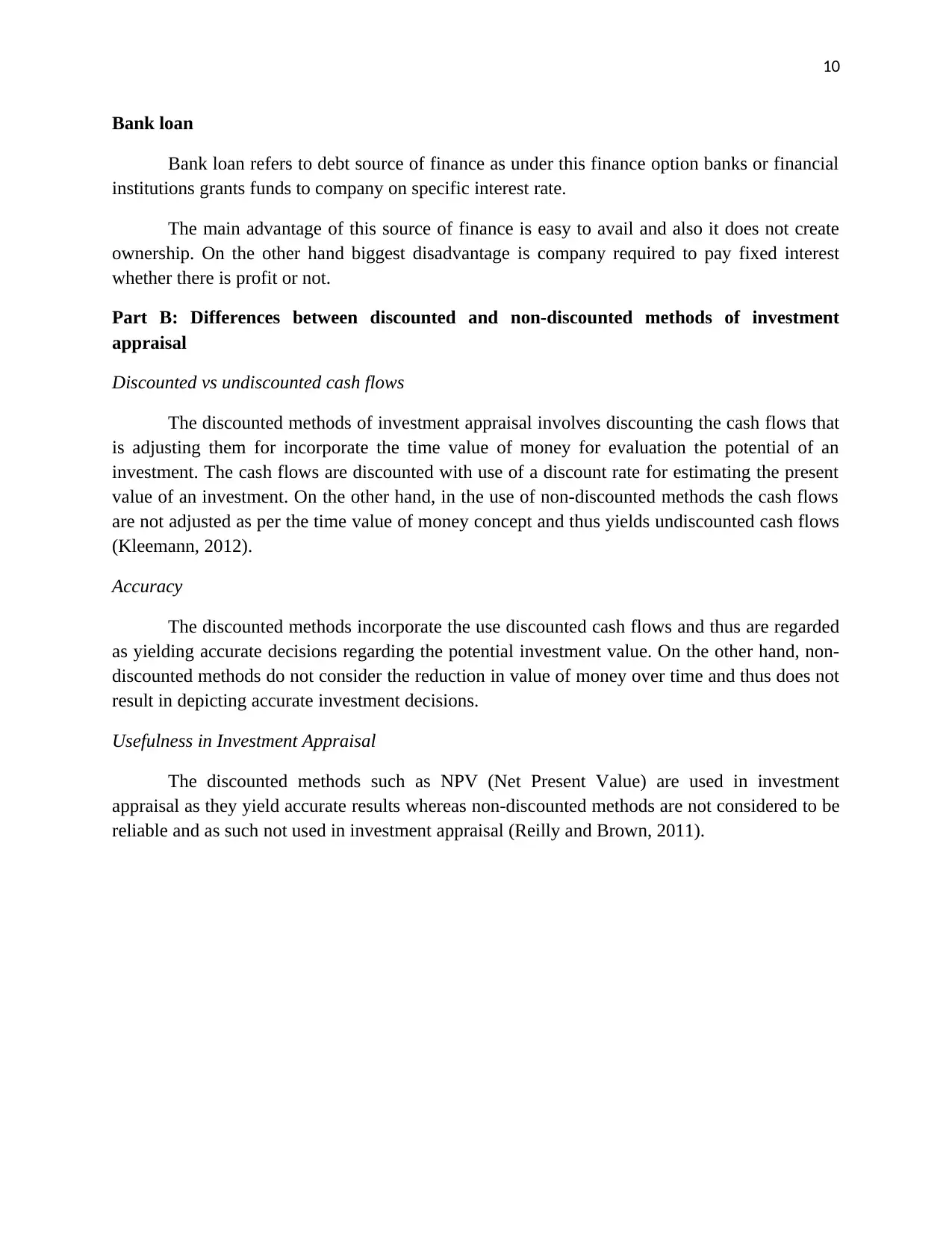
10
Bank loan
Bank loan refers to debt source of finance as under this finance option banks or financial
institutions grants funds to company on specific interest rate.
The main advantage of this source of finance is easy to avail and also it does not create
ownership. On the other hand biggest disadvantage is company required to pay fixed interest
whether there is profit or not.
Part B: Differences between discounted and non-discounted methods of investment
appraisal
Discounted vs undiscounted cash flows
The discounted methods of investment appraisal involves discounting the cash flows that
is adjusting them for incorporate the time value of money for evaluation the potential of an
investment. The cash flows are discounted with use of a discount rate for estimating the present
value of an investment. On the other hand, in the use of non-discounted methods the cash flows
are not adjusted as per the time value of money concept and thus yields undiscounted cash flows
(Kleemann, 2012).
Accuracy
The discounted methods incorporate the use discounted cash flows and thus are regarded
as yielding accurate decisions regarding the potential investment value. On the other hand, non-
discounted methods do not consider the reduction in value of money over time and thus does not
result in depicting accurate investment decisions.
Usefulness in Investment Appraisal
The discounted methods such as NPV (Net Present Value) are used in investment
appraisal as they yield accurate results whereas non-discounted methods are not considered to be
reliable and as such not used in investment appraisal (Reilly and Brown, 2011).
Bank loan
Bank loan refers to debt source of finance as under this finance option banks or financial
institutions grants funds to company on specific interest rate.
The main advantage of this source of finance is easy to avail and also it does not create
ownership. On the other hand biggest disadvantage is company required to pay fixed interest
whether there is profit or not.
Part B: Differences between discounted and non-discounted methods of investment
appraisal
Discounted vs undiscounted cash flows
The discounted methods of investment appraisal involves discounting the cash flows that
is adjusting them for incorporate the time value of money for evaluation the potential of an
investment. The cash flows are discounted with use of a discount rate for estimating the present
value of an investment. On the other hand, in the use of non-discounted methods the cash flows
are not adjusted as per the time value of money concept and thus yields undiscounted cash flows
(Kleemann, 2012).
Accuracy
The discounted methods incorporate the use discounted cash flows and thus are regarded
as yielding accurate decisions regarding the potential investment value. On the other hand, non-
discounted methods do not consider the reduction in value of money over time and thus does not
result in depicting accurate investment decisions.
Usefulness in Investment Appraisal
The discounted methods such as NPV (Net Present Value) are used in investment
appraisal as they yield accurate results whereas non-discounted methods are not considered to be
reliable and as such not used in investment appraisal (Reilly and Brown, 2011).
Paraphrase This Document
Need a fresh take? Get an instant paraphrase of this document with our AI Paraphraser
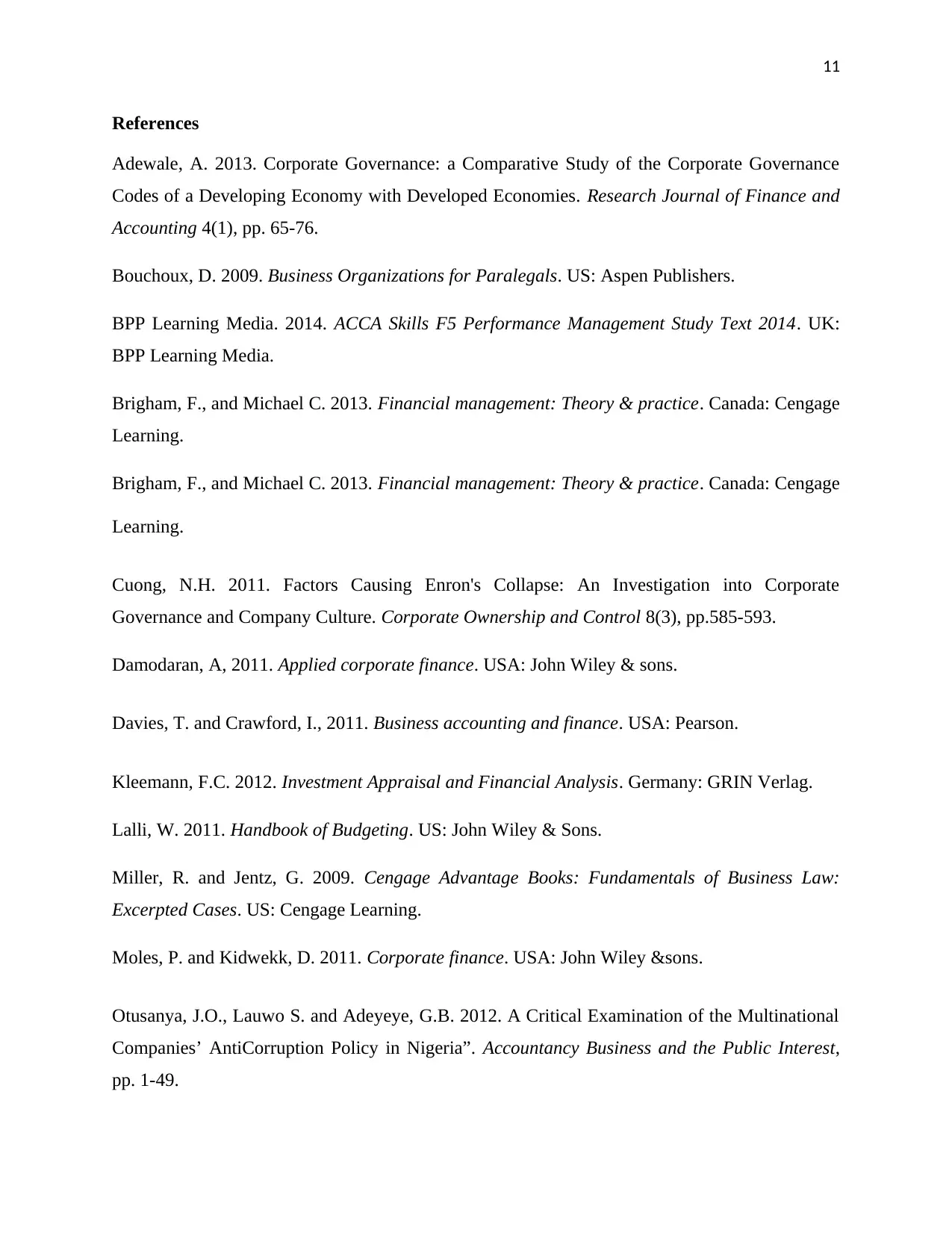
11
References
Adewale, A. 2013. Corporate Governance: a Comparative Study of the Corporate Governance
Codes of a Developing Economy with Developed Economies. Research Journal of Finance and
Accounting 4(1), pp. 65-76.
Bouchoux, D. 2009. Business Organizations for Paralegals. US: Aspen Publishers.
BPP Learning Media. 2014. ACCA Skills F5 Performance Management Study Text 2014. UK:
BPP Learning Media.
Brigham, F., and Michael C. 2013. Financial management: Theory & practice. Canada: Cengage
Learning.
Brigham, F., and Michael C. 2013. Financial management: Theory & practice. Canada: Cengage
Learning.
Cuong, N.H. 2011. Factors Causing Enron's Collapse: An Investigation into Corporate
Governance and Company Culture. Corporate Ownership and Control 8(3), pp.585-593.
Damodaran, A, 2011. Applied corporate finance. USA: John Wiley & sons.
Davies, T. and Crawford, I., 2011. Business accounting and finance. USA: Pearson.
Kleemann, F.C. 2012. Investment Appraisal and Financial Analysis. Germany: GRIN Verlag.
Lalli, W. 2011. Handbook of Budgeting. US: John Wiley & Sons.
Miller, R. and Jentz, G. 2009. Cengage Advantage Books: Fundamentals of Business Law:
Excerpted Cases. US: Cengage Learning.
Moles, P. and Kidwekk, D. 2011. Corporate finance. USA: John Wiley &sons.
Otusanya, J.O., Lauwo S. and Adeyeye, G.B. 2012. A Critical Examination of the Multinational
Companies’ AntiCorruption Policy in Nigeria”. Accountancy Business and the Public Interest,
pp. 1-49.
References
Adewale, A. 2013. Corporate Governance: a Comparative Study of the Corporate Governance
Codes of a Developing Economy with Developed Economies. Research Journal of Finance and
Accounting 4(1), pp. 65-76.
Bouchoux, D. 2009. Business Organizations for Paralegals. US: Aspen Publishers.
BPP Learning Media. 2014. ACCA Skills F5 Performance Management Study Text 2014. UK:
BPP Learning Media.
Brigham, F., and Michael C. 2013. Financial management: Theory & practice. Canada: Cengage
Learning.
Brigham, F., and Michael C. 2013. Financial management: Theory & practice. Canada: Cengage
Learning.
Cuong, N.H. 2011. Factors Causing Enron's Collapse: An Investigation into Corporate
Governance and Company Culture. Corporate Ownership and Control 8(3), pp.585-593.
Damodaran, A, 2011. Applied corporate finance. USA: John Wiley & sons.
Davies, T. and Crawford, I., 2011. Business accounting and finance. USA: Pearson.
Kleemann, F.C. 2012. Investment Appraisal and Financial Analysis. Germany: GRIN Verlag.
Lalli, W. 2011. Handbook of Budgeting. US: John Wiley & Sons.
Miller, R. and Jentz, G. 2009. Cengage Advantage Books: Fundamentals of Business Law:
Excerpted Cases. US: Cengage Learning.
Moles, P. and Kidwekk, D. 2011. Corporate finance. USA: John Wiley &sons.
Otusanya, J.O., Lauwo S. and Adeyeye, G.B. 2012. A Critical Examination of the Multinational
Companies’ AntiCorruption Policy in Nigeria”. Accountancy Business and the Public Interest,
pp. 1-49.
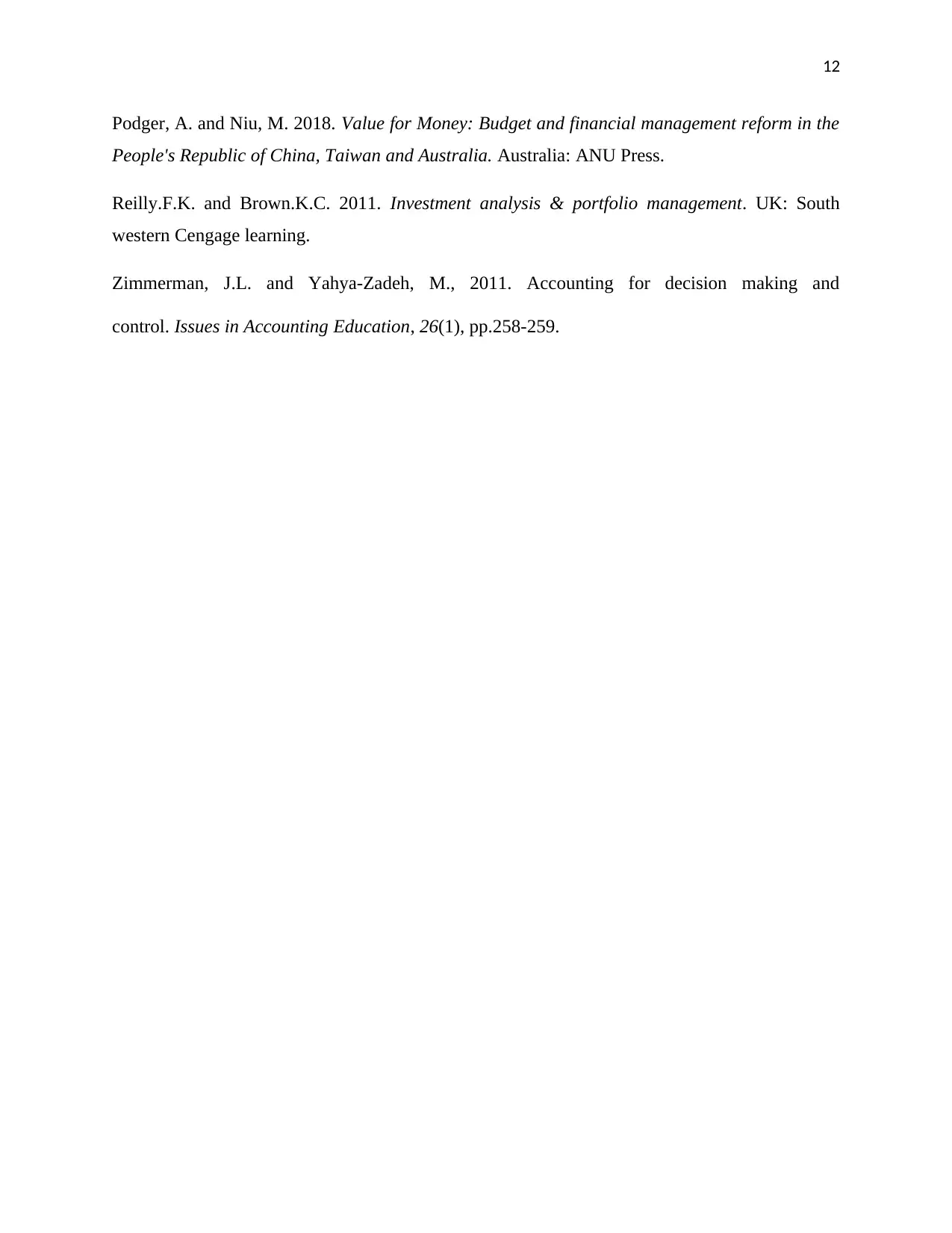
12
Podger, A. and Niu, M. 2018. Value for Money: Budget and financial management reform in the
People's Republic of China, Taiwan and Australia. Australia: ANU Press.
Reilly.F.K. and Brown.K.C. 2011. Investment analysis & portfolio management. UK: South
western Cengage learning.
Zimmerman, J.L. and Yahya-Zadeh, M., 2011. Accounting for decision making and
control. Issues in Accounting Education, 26(1), pp.258-259.
Podger, A. and Niu, M. 2018. Value for Money: Budget and financial management reform in the
People's Republic of China, Taiwan and Australia. Australia: ANU Press.
Reilly.F.K. and Brown.K.C. 2011. Investment analysis & portfolio management. UK: South
western Cengage learning.
Zimmerman, J.L. and Yahya-Zadeh, M., 2011. Accounting for decision making and
control. Issues in Accounting Education, 26(1), pp.258-259.
⊘ This is a preview!⊘
Do you want full access?
Subscribe today to unlock all pages.

Trusted by 1+ million students worldwide
1 out of 12
Related Documents
Your All-in-One AI-Powered Toolkit for Academic Success.
+13062052269
info@desklib.com
Available 24*7 on WhatsApp / Email
![[object Object]](/_next/static/media/star-bottom.7253800d.svg)
Unlock your academic potential
Copyright © 2020–2026 A2Z Services. All Rights Reserved. Developed and managed by ZUCOL.





